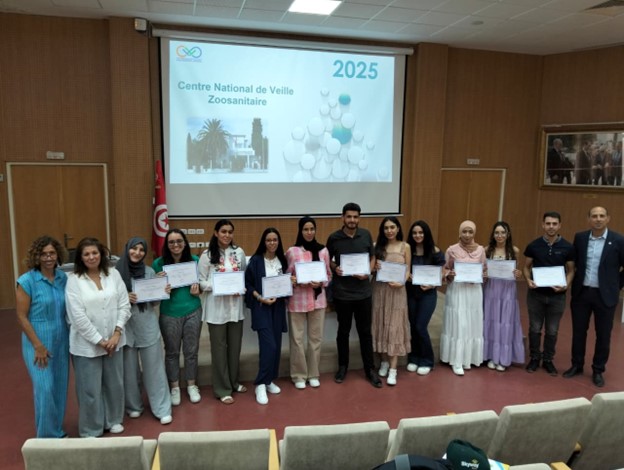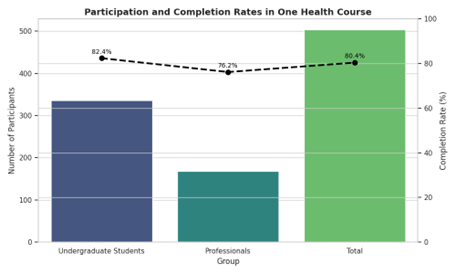
From campus to community: FAO VLC's One Health training unites students and professionals in North Africa
FAO/Sofien Sghaier
15/09/2025
As global health challenges grow more interconnected, the One Health (OH) approach—linking human, animal, and environmental health—is more essential than ever. To support this, Food and Agriculture Organization of the United Nations (FAO) Virtual Learning Centers, in partnership with the FAO Regional Office for the Near East and North Africa (RNE) and the FAO Office for North Africa, launched a French-language One Health course tailored to professionals and students across North Africa on 10 June 2025.
A strategic step toward building One Health capacity
The course aimed to strengthen awareness and understanding of One Health, with a focus on antimicrobial resistance (AMR), biodiversity, ecosystem health, and emerging health risks.
"This One Health training strengthens health resilience in North Africa. Through FAO’s Virtual Learning Centers, it connects students and professionals to build shared capacity against challenges like antimicrobial resistance and emerging zoonoses, while fostering a new generation of leaders committed to safeguarding human, animal, and environmental health." says Dr.Mohammed Bengoumi, Animal Production Health Officer, FAO
Course Format:
Conducted entirely online over five weeks, the course featured a live opening webinar, followed by four weeks of tutored content, case study exercises, interactive discussions, and expert-led forums.
Participants explored key topics each week, including:
- Introduction to the One Health approach
- Sources of pathogens
- Anthropogenic drivers of disease emergence
- Impact of infectious diseases on health systems
The final week included an assessment and a closing webinar focused on AMR awareness.
Participation & Completion Highlights
The course attracted 504 participants, with more than 80 percent successfully completing the programme—an impressive level of engagement that bridged generational and professional perspectives.


These figures underscore the course’s high level of engagement and its ability to bridge generational and professional perspectives within One Health learning.
Youth as Drivers of Future One Health Action
This course marked a key milestone in youth engagement with One Health. For the first time, undergraduate students from Algeria, Morocco, Tunisia, and Senegal were formally included in VLC’s structured training—highlighting their potential to lead future collaboration and innovation.
“Empowering youth is vital to building resilient health systems. Their energy and commitment to One Health today will shape tomorrow’s global response.” — Dr. Rehab Elbassal, VLC Manager, FAO Regional Office for the Near East and North Africa
By introducing students early to interdisciplinary challenges, the programme equips them to address zoonotic diseases, climate risks, and other development threats with innovative perspectives and long-term vision.
Academic Endorsement: Building One Health into Curricula
Academic institutions across the participating countries welcomed this initiative as a valuable contribution to student training and curriculum development. In particular, the École nationale de médecine vétérinaire de Sidi Thabet in Tunisia actively supported student participation and highlighted the long-term benefits.
“This training provided our undergraduate students with an invaluable opportunity to engage in real-world, interdisciplinary health challenges. It supports our efforts to embed the One Health approach into our curriculum and better prepare our graduates for the complex health landscape they will face.”
— Prof. Raouf Dhaouadi, Dean, École nationale de médecine vétérinaire de Sidi Thabet, Tunisia
By bringing together students and professionals, the course fostered cross-generational, intersectoral dialogue, enhancing the relevance of One Health education to real-world policy and practice.
Looking Ahead
FAO and its partners will expand One Health training in the region, prioritizing youth engagement, inclusivity, and regional collaboration. Strengthening the capacity of the next generation of health professionals remains central to advancing health security, food safety, and sustainability.
